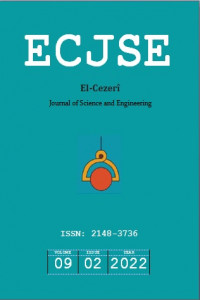Abstract
Abstract: Recently molecular activity of dimetridazole (DMZ) gained interested due to medical applications. In this study, a computational investigation of the solvent impact on solvation free energy, dipole moments, polarizability, hyper-polarizability and characteristic atomic properties; hardness and softness quality, chemical potential, electronegativity and electrophilicity have been accounted for DMZ. All forms of the calculation for both gas phase and solution phase used Becke 3-Parameter of Lee-Yang parr (B3LYP) theory with a 631++G basis set. Using the Solvation Model on Density (SMD), the effect of solvent polarity on solvation free energy, dipole moment, polarizability, hyper-polarizability and molecular properties were measured. The dipole moment of the DMZ was lower value in a gas phase comparative with solution phase. Furthermore, the electronegativity and chemical potential were increased from non-polar to polar solvents, while electrophilicity index was decreased. However, in case of chemical hardness & softness, the opposite relationship has been found. The results of this study contribute to an understanding of the molecular activity of DMZ, and stimulate its activity in solution phase.
References
- Boechat N., Carvalho A. S., Salomão K., de Castro S. L., Araujo-Lima C. F., Mello F. V., Felzenszwalb I., Aiub C. A., Conde T. R. and Zamith H. P., "Studies of genotoxicity and mutagenicity of nitroimidazoles: demystifying this critical relationship with the nitro group", Memorias do Instituto Oswaldo Cruz, 2015, 110(4): 492-499.
- Posyniak A., Semeniuk S., Žmudzki J., Niedzielska J. and Biernacki B., "Residues of dimetridazole in eggs after treatment of laying hens", Veterinary Research Communications, 1996, 20(2): 167-174.
- Hobson-Frohock A. and Reader J. A., "Determination of dimetridazole residues in poultry tissues by high-performance liquid chromatography", Analyst, 1983, 108(1290): 1091-1095.
- Mallinson III E. T., Henry A. C. and Rowe L., "Determination of nitroimidazole metabolites in swine and turkey muscle by liquid chromatography", Journal of AOAC International, 1992, 75(5): 790-795.
Abstract
Abstract: Recently molecular activity of dimetridazole (DMZ) gained interested due to medical applications. In this study, a computational investigation of the solvent impact on solvation free energy, dipole moments, polarizability, hyper-polarizability and characteristic atomic properties; hardness and softness quality, chemical potential, electronegativity and electrophilicity have been accounted for DMZ. All forms of the calculation for both gas phase and solution phase used Becke 3-Parameter of Lee-Yang parr (B3LYP) theory with a 631++G basis set. Using the Solvation Model on Density (SMD), the effect of solvent polarity on solvation free energy, dipole moment, polarizability, hyper-polarizability and molecular properties were measured. The dipole moment of the DMZ was lower value in a gas phase comparative with solution phase. Furthermore, the electronegativity and chemical potential were increased from non-polar to polar solvents, while electrophilicity index was decreased. However, in case of chemical hardness & softness, the opposite relationship has been found. The results of this study contribute to an understanding of the molecular activity of DMZ, and stimulate its activity in solution phase.
Keywords: Dimetrizole, Solvation model, Dipole moment, Solvent-free energy, Molecule polarizability.
References
- Boechat N., Carvalho A. S., Salomão K., de Castro S. L., Araujo-Lima C. F., Mello F. V., Felzenszwalb I., Aiub C. A., Conde T. R. and Zamith H. P., "Studies of genotoxicity and mutagenicity of nitroimidazoles: demystifying this critical relationship with the nitro group", Memorias do Instituto Oswaldo Cruz, 2015, 110(4): 492-499.
- Posyniak A., Semeniuk S., Žmudzki J., Niedzielska J. and Biernacki B., "Residues of dimetridazole in eggs after treatment of laying hens", Veterinary Research Communications, 1996, 20(2): 167-174.
- Hobson-Frohock A. and Reader J. A., "Determination of dimetridazole residues in poultry tissues by high-performance liquid chromatography", Analyst, 1983, 108(1290): 1091-1095.
- Mallinson III E. T., Henry A. C. and Rowe L., "Determination of nitroimidazole metabolites in swine and turkey muscle by liquid chromatography", Journal of AOAC International, 1992, 75(5): 790-795.
Details
| Primary Language | English |
|---|---|
| Subjects | Engineering |
| Journal Section | Makaleler |
| Authors | |
| Publication Date | May 31, 2022 |
| Submission Date | September 25, 2021 |
| Acceptance Date | October 28, 2021 |
| Published in Issue | Year 2022 Volume: 9 Issue: 2 |



